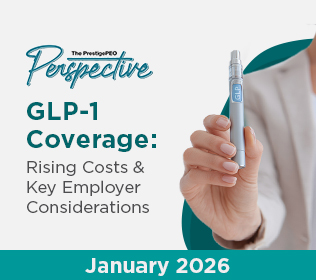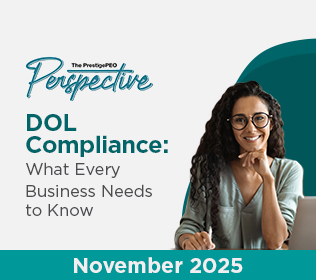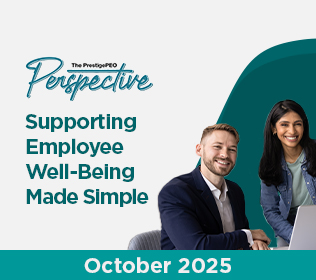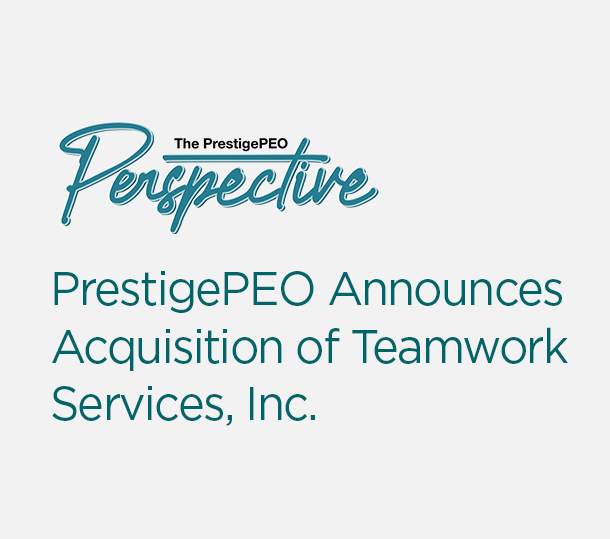

PrestigePEO Acquires Georgia-Based PEO Teamwork Services
Expanding Reach and Increasing Service Offerings
We’re quickly approaching another election – and that means workplace discussions could cause conflicts. Learn how to ensure your employees know about their rights to voting leave, promote civic engagement responsibly and prevent tension by maintaining a neutral environment.

Learn More About the Four Types of Employee Benefits Plans
Do you know what benefits your employees value most? Research shows that health benefits remain a top priority. Learn more innovative strategies to deliver the four most sought-after benefits: health insurance, dental and vision coverage, retirement plans, and life and disability insurance. Support your workforce with the benefits they genuinely care about.

Your Guide to Overtime Pay Laws
What to Know About Overtime Pay Laws
Labor laws play a crucial role in shaping workplace policies and operations. The Fair Labor Standards Act (FLSA) sets clear guidelines on overtime pay, defining exempt and nonexempt employees and ensuring eligible workers receive at least time-and-a-half pay for hours worked beyond 40 in a week.
Want to ensure your business stays compliant? Read our full article to learn more about these essential regulations and how they impact your organization.
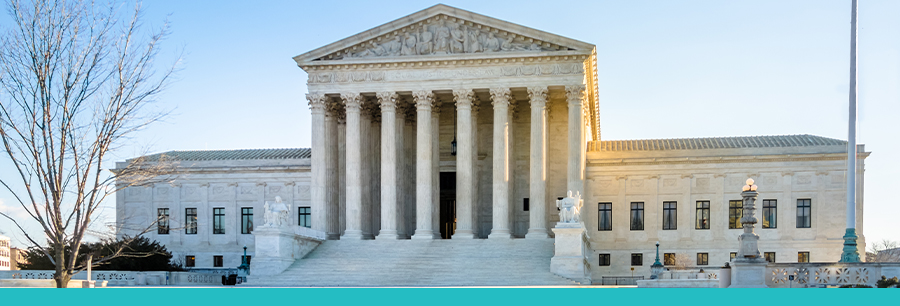
Supreme Court Docket Filled with Employment-Related Cases in New Term
The Supreme Court of the United States began its new term on October 7, 2024, with a growing docket filled with cases that employers need to keep track of as having potential implications on the workplace. Currently, five cases present employment related issues that include wage and hour matters, ADA interplay with former employees, cannabis company liability in the employment arena, the application of federal civil rights law in conjunction with state administrative remedies, and the determination of “prevailing party” for attorney fee award provisions.
At the top of most employer’s list is E.M.D. Sales Inc. v. Carrera, wherein the Supreme Court will navigate disagreements between federal appeals court decisions involving matters of employee classification exemption status from minimum wage and overtime provisions of the Fair Labor Standards Act. At issue is the question of how much proof employers need to offer in supporting efforts to properly classify employees when claims of misclassification and unpaid wages are made. Specifically, the question before the court is whether an employer claiming an overtime exemption will have to show their supporting evaluation criteria by the higher standard of clear and convincing proof or meet the lesser criteria of a preponderance of the evidence standard.
The facts of E.M.D. Sales Inc. involve several employees of a grocery food distribution company who claim misclassification as outside sale exempt status and demanded overtime wages, for which they would not otherwise be eligible under the outside sales classification. The Fourth Circuit Court of Appeals found in the employees’ favor, requiring the heightened burden of clear and convincing evidence as proof from their employers as to the outside sales classification. This heightened standard deviates from the standard already set forth in six other Circuit Court of Appeals who all agree that the mere preponderance of the evidence is the standard burden for employers to meet. While the outside sales exemption is at issue in this specific matter, the Court’s ruling will likely impact all 34 of exemptions under the FLSA. Oral arguments are slated for November 5th, and we will keep you updated as to the outcome.
Another case before the Court involves a former employee’s claim of violations of the American with Disability Act, when her employer changed health insurance coverage from free coverage until the age of 65 to only 24 months of coverage for employees that retired because of a qualifying disability. In Stanley v. City of Sanford, FL, the 11th Circuit ruled that the former firefighter, who retired due to a qualifying disability under the health insurance coverage carveout, could not bring a claim of discrimination in violation of the ADA, because the right to sue is limited to current employees and job applicants, not retirees, despite the change in benefits claimed to be owed to this former employee. The Supreme Court is set to make a determination on this distinction between current and former employee standing, this term.
A third matter before the Court highlights the evolving laws surrounding cannabis in the employment context. In Medical Marijuana, Inc. v. Horn, a commercial truck driver, responsible for passing periodic drug screens, was terminated when he failed a drug screen due to the presence of illegal THC. The driver claims that he was only aware of the presence of CBD, the generally legal non-psychoactive component in cannabis, and in an unprecedented move, sued the cannabis distributor under the Racketeer Influenced and Corrupt Organizations Act (RICO), claiming RICO violations and monetary damages for personal injuries. The cannabis distributor argues for dismissal of the RICO claim asserting a products liability claim instead. The Court is set to weigh in on this matter which will inevitably impact cannabis regulations in the workplace moving forward.
The fourth case for employers to keep an eye out on involves the question of whether employees need to exhaust all state administrative remedies prior to bringing a claim under federal civil rights laws. In Williams v. Washington, Alabama workers who applied for unemployment insurance benefits during Covid-19 sued state government officials for violations of the Social Security Act of 1935, claiming that the state’s policies, practices, and procedures related to unemployment compensation applications violated federal civil rights laws under 42 U.S.C. Section 1983 and constitutional due process rights. The Alabama Supreme Court held that state law requires the plaintiffs to first bring these types of claims to the state’s Department of Labor, further requiring plaintiffs to exhaust all administrative remedies prior to filing claims of federal civil rights violations. At issue for the Supreme Court is whether or not these federal civil rights violation claims need to be heard through the state administrative remedies process prior to bringing a federal action.
The final matter currently on the Court’s docket, while not arising in an employment law context, will have possible implications on employment law claims that arise under assertions of civil rights violations and ultimately who shall be considered the “prevailing party” for purposes of awarding attorney fees. Under the provisions of 42 U.S.C. Section 1988, a “prevailing party” in certain civil rights actions can recover their reasonable attorney fees. In the matter of Lackey v. Stinnie, the Supreme Court will consider whether a party that prevails under a preliminary injunction without ultimately prevailing on the merits of the claim shall be considered a “prevailing party” for purposes of seeking a fee award.
As the new Supreme Court term is well underway, PrestigePEO is here to help and will be tracking and reporting on the outcome of the Court’s decisions, as they become available.
Contact us with questions.

New York City Council Considers Two Groundbreaking New Laws
Safe Hotels Act
Two pioneering regulations are making waves in New York City. The first of which is called the Safe Hotels Act, which has already passed City Council and is awaiting Mayor Adams’ signature. This new law outlines a number of regulations aimed at the safety and cleanliness of New York City hotels. Originating in efforts to address crime and human trafficking within the city, critics suggest that the regulations go beyond that which was initially intended, and instead place heavy restrictions on how hotels operate and appear to be encouraging union activity among employees.
The Safe Hotels Act is comprised of three basic requirements that include: human trafficking training for all employees, new safety standards that will be outlined below, and new requirements that all hotel operators obtain a license to operate from The Department of Consumer and Worker Protection (DCWP).
The safety standards require that:
- There is continuous coverage at the hotel front desk, including overnight shifts, by at least one employee who has undergone human trafficking training and can confirm the identity of all guests.
- The hotel is required to maintain safe conditions on the property for all guests and hotel workers, however the act does not define what safe conditions involve.
- The hotel is also required to maintain cleanliness of all guest rooms, sanitary facilities, and common areas, but again is unclear as to any specific standard for the cleanliness requirement.
- Guest requests for new towels and linens must be honored.
- All guest rooms must be cleaned, and trash removed daily, unless a guest proactively declines the hotel cleaning service. No additional fees may be required by the hotel for daily cleaning, nor can a hotel offer a discount for allowing guests to decline the daily cleaning.
- All employees who are required to enter occupied hotel rooms will be required to be provided a panic button.
- All hotels, except for those within one mile of either LaGuardia or John F. Kenndy airports, are prohibited from taking hotel reservations for less than four hours.
Furthermore, hotels will now be required to obtain a license to operate within the city, which will cost $350 and be valid for a period of two years. There is very little information available as to what criteria will be used for the licensing process, but the act allows for the licensing requirement to be “satisfied by a collective bargaining agreement that expressly incorporates the requirements of” this Safe Hotels Act. The act places further restrictions on the use of certain types of employees by limiting the use of subcontractors for hotels with 100 or more guest rooms and requiring larger hotels to directly employee all core employees, with limited exceptions.
While there is a vast amount of ambiguity surrounding this new law, as it awaits Mayor Adams decision, PrestigePEO is here to help and will continue to monitor and provide updates as they become available.
Time Off to Care for Pets
In a first of its kind, a bill recently proposed in the New York City Council would allow employees to take time off to care for their pets. This proposed regulation would expand the provisions that currently exist under the City’s Earned Safe and Sick Time Act to include time off for pet-related medical care needs.
Safe and Sick Time Act, employees of larger companies employing 100 or more workers are provided up to 56 hours of paid leave per year, while employees at smaller companies are provided up to 40 hours of paid sick leave, for purposes of caring for themselves or an ill family member. These proposed changes would now allow for employees to use this existing paid leave for the care of their pets, including diagnosing and treating illnesses as well as preventive care appointments. If passed, this law would be a first of its kind and could very well become part of a nationwide trend towards acknowledging the role pets play in the lives of their humans and the positive mental health impacts associated with pet ownership.
Reach out to PrestigePEO with questions about these laws.

Update on California Workplace Laws
As the California legislative session comes to close, Governor Gavin Newsome has approved several bills that were passed by the legislature. Many of these new laws will become effective on January 1, 2025. In addition to the passed bills, there were some bills that were also vetoed as outlined below.
PASSED BILLS
- Ban on Captive Audience Meetings
Governor Newsome signed Senate Bill 399 into law that will prohibit employers from carrying out required meetings that discuss religious and political matters including conversations about union representation. The employer will be prohibited from discriminating against, terminating, retaliating, or otherwise taking any adverse employment action against the employees for refusal to attend. Employees are allowed a private cause of action for alleged violations as well as the recovery of punitive damages. This law goes into effect on January 1, 2025.
- Victims of Violence
The Governor signed Assembly Bill 2499 into law which affords employees time off when they are affected by certain crimes or are victims of abuse, and also allow employees to take time off to assist family members who are victims of specified crimes. This law updates the existing law by expanding not only who is entitled to protections under the law, but also the reasons for necessitating use of the Victim-of-Violence leave. Enforcement of this law is will now by maintained by California’s Civil Rights Department and goes into effect on January 1, 2025.
- Private Attorneys General Act (PAGA) Exemption Expanded
Governor Gavin Newsome signed Assembly Bill 1034 into law that will ensure that unionized construction industry employers who meet specified criteria continue to be exempt from PAGA lawsuits for the next 14 years. The exemption applies to employers of unionized construction employees who pay workers at least 30% more than minimum wage, among other requirements, and when initially passed, was intended to be temporary, sunsetting on or before January 1, 2028. The new law will go into effect on January 1, 2025, and extends the exemption period to January 1, 2038.
- Employment Discrimination and Driver’s License Requirements
Governor Gavin Newsome signed Senate Bill 1100 into law that will prohibit employers from informing job seekers they need to have a driver’s license for an open position unless the position satisfies a two prong test: (1) the employer reasonably expects driving to be one of the job functions, and (2) the employer believes that satisfying the job function using an alternative form of transportation would not be comparable in travel time or cost to their business. The alternative forms of transportation may include options such as public transportation, taxi, carpooling, bicycling, or walking. This goes into effect on January 1, 2025.
- Expanded Protections for Freelance Workers
Governor Gavin Newsome signed Senate Bill 988 into law which will increase protections for Freelance Workers/Independent Contractors. Private employers who hire freelancers will be required to provide a written agreement identifying certain terms, that otherwise give freelance workers “basic worker protections” and indicate a deadline of when their compensation is due. These expanded protections go into effect on January 1, 2025.
- Local Enforcement of Employment Discrimination Law
Governor Newsome signed Senate Bill 1340 into law which allows local agencies to enforce both the state’s employment discrimination laws as well as local employment anti-discrimination laws that are more stringent than those of the state, when employees bring a right-to-sue from the Civil Rights Department (CRD). The new law will go into effect on January 1, 2025.
- New Requirements for Employers Conducting Social Compliance Audits
Governor Newsome signed Assembly Bill 3234 into law, which will require businesses to share results of voluntary social compliance audits and post a link of the finding on its website related to wage and hour requirements, health and safety regulations, and regulations related to child labor. While the decision whether to conduct a social compliance audit are voluntary, if conducted, businesses will now be required to report results by posting to a conspicuous link on their website. The law will go into effect on January 1, 2025.
VETOED BILLS
- SB 1047–Artificial Intelligence Safety bill
overnor Gavin Newsom has vetoed Senate Bill 1047, that sought to add new requirements to developments of large AI models, which could impact resources used by employers. This bill was vetoed due to opposition from tech industry and policy makers.
- SB 1022- Enforcement of Civil Rights
Governor Gavin Newsom has vetoed Senate Bill 1022. This bill would have increased the statute of limitations for “group or class complaints” brought with the California Civil Rights Department to seven years. Governor Newsome had asked the lawmakers to propose a bill with a more reasonable period of time.
- SB 1299- Farmer’s and Worker’s Compensation
Governor Gavin Newsome has vetoed Senate Bill 1299. The proposed bill would create a “disputable presumption” that a heat-related injury that develops within a specified timeframe after an employee was working outdoors for an employer in the agriculture industry that fails to comply with heat illness prevention standards, as defined, arose out of and came in the course of employment.
Contact PrestigePEO if you have questions about these changes and how they impact you.

2025 Employee Wage and Exemption Threshold Changes
As employers wrap up the year and plan compensation strategies, an essential compliance update from the Department of Labor (DOL) is on the horizon. As a reminder, on January 1, 2025, the DOL will implement the second stage of its minimum wage increase and raise the salary thresholds for exempt employees under the Fair Labor Standards Act (FLSA).
In addition to the new threshold of $58,656 annually per year ($1,128 per week) for general white-collar exemptions, the threshold for highly compensated employees will also rise. Starting in 2025, employees earning over $151,164 annually may qualify as exempt if they meet a less stringent duties test under the FLSA. For employers, this presents an opportunity to reassess compensation for higher-earning employees, especially those currently exempt under the highly compensated category, and determine if their compensation or duties need adjustment to remain compliant.
Employers with exempt employees currently earning below these thresholds should prepare to either adjust salaries to meet the new standards or reclassify these roles as non-exempt. Reclassification will require tracking actual hours worked, given the FLSA’s overtime mandate of 1.5 times the regular pay rate for hours over 40 in a workweek.
The DOL’s new thresholds are subject to ongoing legal challenges, and there is a possibility of delay or adjustment. However, considering the anticipated effective date of January 1, proactive planning is recommended to manage these changes’ financial and operational impact.
Evaluating whether current employees meet the updated standards will ensure compliance and minimize disruption as new wage regulations take effect.
PrestigePEO is focused on supporting your business and will continue to monitor and provide updates as additional information on these changes becomes available.

